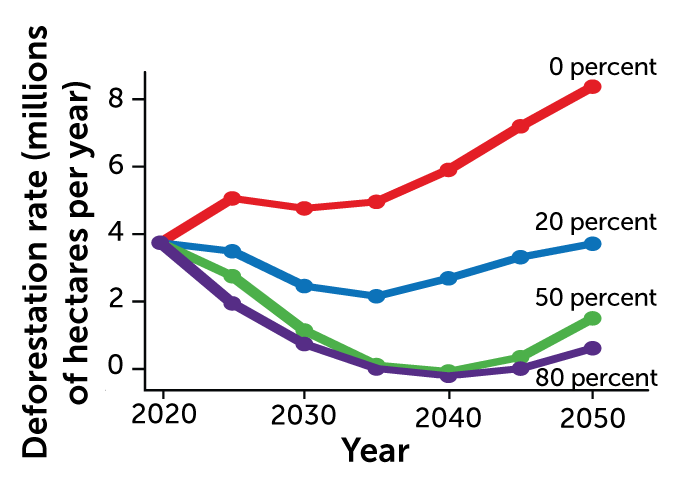“Fungi Fridays” could save a lot of trees — and take a bite out of greenhouse gas emissions. Eating one-fifth less red meat and instead munching on microbial proteins derived from fungi or algae could cut annual deforestation in half by 2050, researchers report May 5 in Nature.
Raising cattle and other ruminants contributes methane and nitrous oxide to the atmosphere, while clearing forests for pasture lands adds carbon dioxide (SN: 4/4/22; SN: 7/13/21). So the hunt is on for environmentally friendly substitutes, such as lab-grown hamburgers and cricket farming (SN: 9/20/18; SN: 5/2/19).
Another alternative is microbial protein, made from cells cultivated in a laboratory and nurtured with glucose. Fermented fungal spores, for example, produce a dense, doughy substance called mycoprotein, while fermented algae produce spirulina, a dietary supplement.

Sign Up For the Latest from Science News
Headlines and summaries of the latest Science News articles, delivered to your inbox
Client key* E-mail Address* Go
Thank you for signing up!
There was a problem signing you up.
Cell-cultured foods do require sugar from croplands, but studies show that mycoprotein produces fewer greenhouse gas emissions and uses less land and water than raising cattle, says Florian Humpenöder, a climate modeler at Potsdam Institute for Climate Impact Research in Germany. However, a full comparison of foods’ future environmental impacts also requires accounting for changes in population, lifestyle, dietary patterns and technology, he says.
So Humpenöder and colleagues incorporated projected socioeconomic changes into computer simulations of land use and deforestation from 2020 through 2050. Then they simulated four scenarios, substituting microbial protein for 0 percent, 20 percent, 50 percent or 80 percent of the global red meat diet by 2050.
Microbial diet scenarios
Swapping some meat in our diet for protein derived from microbes could slash deforestation rates over the next three decades. If no change is made (red line), then about 8 million hectares of forest could be lost per year to pastureland. Replacing 20 percent (blue) of meat for microbial protein could cut that loss by more than half by 2050. Substituting even greater amounts (green, purple) could reduce forest loss even further.
Deforestation rates if meat is replaced by microbial protein, 2020–2050  F. Humpenöder et al/Nature 2022F. Humpenöder et al/Nature 2022
F. Humpenöder et al/Nature 2022F. Humpenöder et al/Nature 2022
A little substitution went a long way, the team found: Just 20 percent microbial protein substitution cut annual deforestation rates — and associated CO2 emissions — by 56 percent from 2020 to 2050.
Eating more microbial proteins could be part of a portfolio of strategies to address the climate and biodiversity crises — alongside measures to protect forests and decarbonize electricity generation, Humpenöder says.

